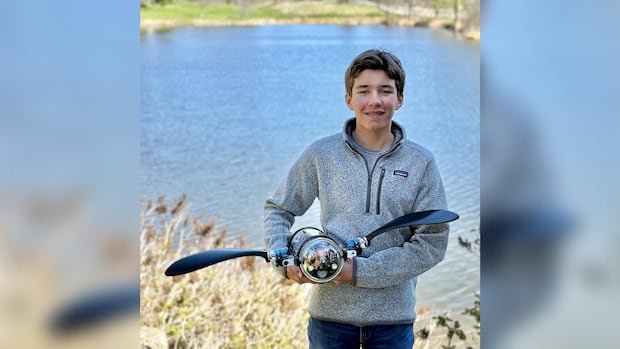A student in Grade 10 from Burlington, Ontario, aims to contribute to the preservation of underwater ecosystems with his award-winning invention, a bionic turtle. Evan Budz developed this autonomous robotic sea turtle for ecological monitoring using artificial intelligence (AI), which secured him the first prize at the European Union Contest for Young Scientists (EUCYS).
In an interview with David Common from CBC Radio’s Metro Morning, Evan explained that his robot mimics a sea turtle’s swimming behavior to autonomously monitor underwater environments for various threats like coral bleaching and invasive species. This innovative creation earned him the Best Project (Innovation) title at the 2025 Canada-Wide Science Fair (CWSF) in Fredericton, along with the Ellison Scholars Award, granting him a trip to Oxford University.
The EUCYS event, held in Riga, Latvia, by the European Commission, attracts young scientists aged 14 to 20 from 40 countries, offering substantial prizes. Among the participants was Sara Waqas, a 16-year-old from Calgary, who won the CWSF 2025 Best Project (Discovery) award and secured the second position at EUCYS for her research on treatment-resistant schizophrenia.
Evan emphasized that the data collected by his bionic turtle will assist organizations in identifying and addressing threats to underwater environments effectively, without disrupting the ecosystems. He highlighted that the design of the robot closely resembles the movements of a turtle to minimize interference with other organisms during monitoring activities.
Inspired by observing a snapping turtle while camping, Evan aimed to develop a non-disruptive monitoring solution for ecological purposes. He mentioned that the robot’s testing in his grandparents’ pool showed a 96% accuracy in detecting replicated coral bleaching, proving its potential to detect threats early and prevent ecological damage.
Reni Barlow, the executive director at Youth Science Canada, praised Evan and Sara’s projects for showcasing the exceptional problem-solving abilities of Canadian youth. Barlow described Evan’s success at EUCYS 2025 as a remarkable innovation that highlights the capability of Canadian youth in addressing complex environmental challenges.
Chandra Sharma, president and CEO of Conservation Halton, commended Evan for his innovative approach to ecosystem monitoring, emphasizing alignment with Conservation Halton’s conservation philosophy. Sharma expressed admiration for Evan’s commitment to marine conservation and anticipated the positive impact of his work on the conservation field.
The achievements of Evan Budz and Sara Waqas underscore the potential of young Canadian scientists to address global environmental issues through innovative solutions and dedicated research efforts.


